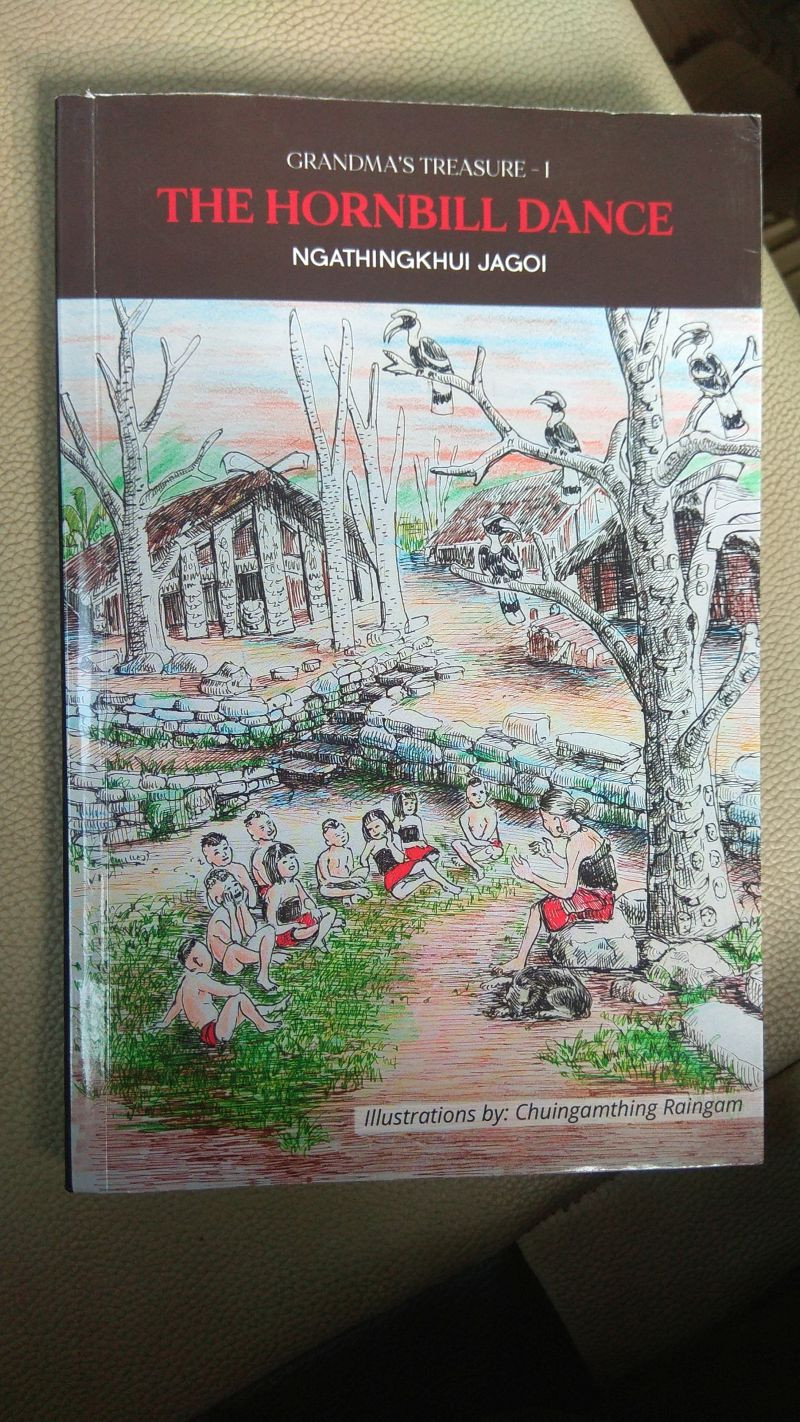
Bobita Rai
‘The Hornbill Dance’ is a collection of twelve short stories authored by Ngathingkhui Jagoi, who felt the pressing need to preserve the age old oral tradition that has almost become extinct. The author has recaptured his childhood memories of listening to grandma Makatunla's stories and I must say he does have quite a retentive memory.
If you are someone who grew up with similar experience during your childhood years, you will definitely savour the contents of the book with nostalgia like I did. And if you never had such experience, hold your breath because there is more for you to be enriched with; your curiosity will entice you till the last page of the book. The lively illustration on the cover page by C Raingam sets the mood for the readers to step into the world-view of the Tangkhul Naga Tribe. I stealthily crept into that world as a silent spectator while grandma Makatunla captured the attention of the restless boys bringing out from her treasure, rich tales that were not just stories but had didactic intentions to inculcate traditional values, belief system, morals to arouse human emotions and set up identity that would influence and shape up their progressive years ahead.
It is indeed fascinating to see the naturally existing parallel universe in most of the stories. So also the cohesivity in few stories with greater range of similarity to Greek myth.
Latharla in 'The Great Change' unwittingly creates a barrier between the living and the dead by throwing a pestle and cursing her dead friends who visits her, thus disrupting the parallel universe. The love story of Longyao and Kamringla in the 'Journey to the Hades' has both the existence of parallel universe and similarity to Greek myth of how Orpheus went down to the Hades to bring back his beloved wife Eurydice. As I read this story, I too had a wistful longing to bring back my loved ones I lost!
'The Kidnapped Angel' and 'The Great Escape to Heaven' actually reminded me of Jacob's dream of ladder (Gen 28) stretching from Heaven to Earth with angels going up and down upon it. The gory detail of Sekeseku breaking the head of the man and sucking his brain and blood; Raiphang turning into Ngunreah the headless maniac likens to the gory scenes in Greek tragedy. Nevertheless, grandma's intention is to explain to the boys how the emergence of Morung culture took place out of extreme fear in those stories. Equally enchanting are the stories where humans metamorphose into animals and dragonfly by means of shape-shifting (The Lean Season, Brotherly Tax, The Bear's wife) which is incredible. But as the author himself mentions in the preface that historical validity of the mythical account of various tales are uncertain. Thus, my main focus as a reader has been to maintain that level of curiosity and simplicity to absorb in the stories as narrated by grandma.
'The Great Escape to Heaven' reminded me of my own grandma who narrated this story when I was a young girl. I had a deep sense of satisfaction reading this story as I could connect all the fragmented parts of the story that I faintly remembered. That left me pondering, how amazing it is that stories are timeless and surpass geographical boundaries, languages, religion, and race though narrative style may differ, these stories somehow brings us together in unity.
The story of the exiled son Karhumwo reminded me of Shakespeare's King Lear. Thats why I reiterate stories are timeless and we have to find ways to pass down to posterity as a rich legacy to be treasured.
The book is truely a treasure in it that there are stories within a story richly laden with songs of lament specially in the story 'The Price of Vanity'. Usage of colloquial and vernacular words sustains the originality of the stories as narrated by grandma Makatunla.
The author has imaginatively textured his writings so effortlessly that when one story concludes, another spontaneously begins through the mouthpiece of grandma who races from the kitchen to the compound between chores, multitasking and keeping the boys occupied with minor chores; at the same time instilling values in them and building a deeper level of bonding. As I sat reading, I actually felt like one of the boys under grandma Makatunla's care listening to her and felt a growing affinity towards her. The writer has deliberately used simple, lucid style of expression to catch the attention of young readers as well as to maintain the simplicity of grandma's narration.
To conclude, we live in times where almost everything seems complicated. Sometimes I question myself if it is not us who complicate simple things. Grandma's treasure has awakened the simplicity and child-likeness in me that is why its effortlessly convincing.
Reading this book has enabled me to deconstruct certain ideas allowing enough space for fresh imaginative thinking besides enriching my own treasure of stories. Perhaps decades later, I will have my own stories to share with my grandchildren and I say this amused by my own thinking.




